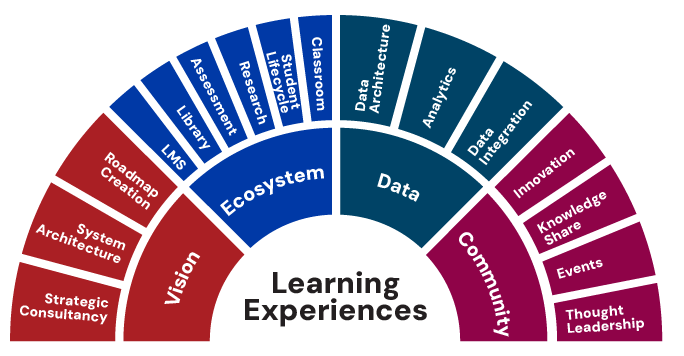We provide high-performance, cost-effective and flexible digital learning and research solutions to the education sector

How do we do it?
At CoSector we believe in enabling our clients to build and evolve their thinking about their digital learning technology as the systems which support the vision.
We have a technology agnostic approach. This, along with our unrivalled breadth of expertise in the sector allow us to offer a suite of services to help you take your student experience to the next level.
Our university foundations mean we can also provide these services in the context of exceptional value for money.
Working in partnership with our customers, we co-create a vision for enhancing user experience, a benefits map for demonstrating impact and value for money, a strategy for aligning systems, process and culture around new ways of working, and a roadmap for how to get there. CoSector brings in-depth sector and technology know-how along with user experience, business and data analysis capabilities and has helped customers shape digital strategies, craft business cases, and design interventions to target step-change improvements in key performance indicators, such as NSS and student retention and progression.
CoSector uses its knowledge of the wider education and research ecosystem to help customers optimise their investment in digital technology and new ways of working. For instance, the most powerful improvements in digital learning experience are often enabled by up-stream changes in curriculum design, which need to cascade through systems such as curriculum management, student records, and learning platform and onwards into specialist video or assessment tools for students to experience the full benefits. CoSector helps institutions look beyond the institutional boundary to the wider ecosystem of identity, skills, competencies, digital wallets and follow-on learning opportunities. Understanding the edtech and research ecosystems and how to optimise outcomes is a core strength for CoSector, grounded in its in-depth knowledge of sector processes and data practices and shared with customers as blueprints that enable specific technology landscapes to be mapped and targeted enhancements to be planned.
CoSector helps customers to unlock the power of data to personalise, streamline and provide a heightened state of awareness about core education and research processes, such as assessment and resource discovery and engagement. CoSector combines knowledge of sector processes and definitive data sources to help customers set up integrations that automate information flows that prioritise the use of data, rather than precious staff time, to configure and personalise downstream systems and provide real-time insights on the effectiveness of policies, such as assignment extensions and student retention interventions. Careful curation of data supports advanced analytics and, with appropriate informed consent, can power Artificial Intelligence to discern patterns and provide actionable insights.
CoSector was established by the University of London to be of and for the sector, nurturing innovation and sharing effective practice across its community of customers and users to enhance educational outcomes. CoSector seeks to promote communities of practice both across its customer base and within individual customers, for instance facilitating virtual team working with Registry, IT, Education and the Academy for digital education innovation, and encouraging the formation of human networks critical for establishing and evolving new ways of working. CoSector is proud to be regarded as part of the team, rather than just a supplier.
Explore CoSector
Our work
Browse our case studies
We have helped over 100 institutions design, build and maintain high-quality learning experiences
Case study
Enhancing the learner experience for Oxford Brookes university
Find out how we helped Oxford Brookes deliver on its vision to become a leader in online learning
Thought piece
Lifelong learning is for institutions too
How do you build institutional readiness and future proof capabilities when budgets are tight?
